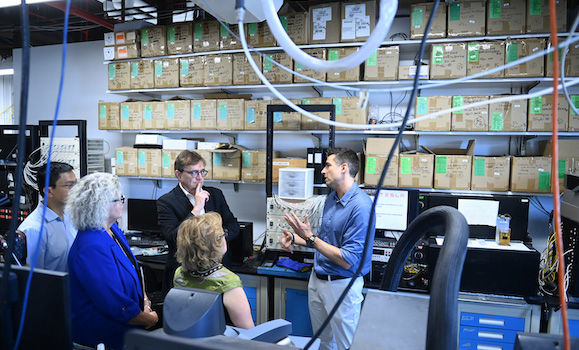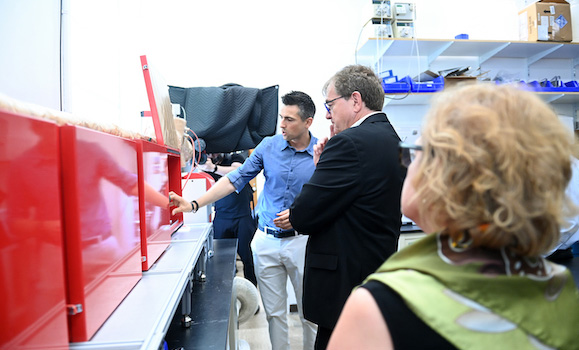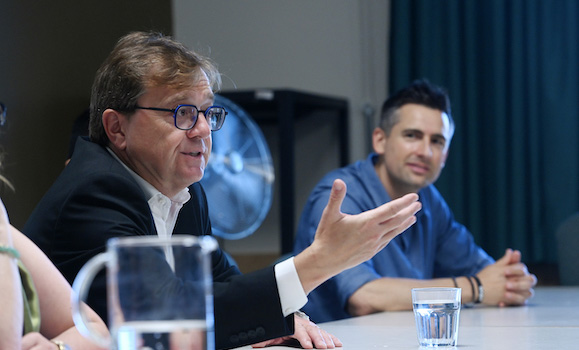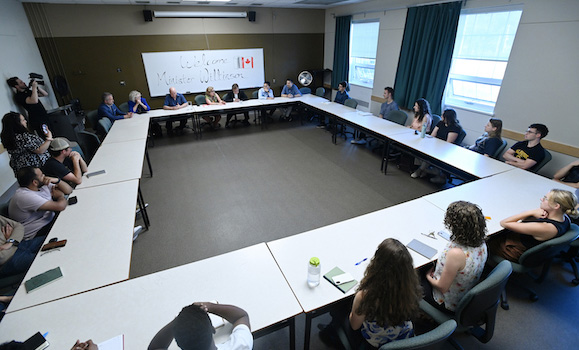Dalhousie’s Canadian Battery Innovation Centre (CBIC) has received a boost in the form of $10.15 million in federal government funding.
The Honourable Jonathan Wilkinson, minister of energy and natural resources, during a visit to Dal’s battery research labs last Wednesday (July 31).
When it opens in fall 2025, the CBIC will be the country’s first university-based battery prototyping and testing facility, making it a hub for energy storage breakthroughs from researchers across industry and academia.
Of the announced funding, $8.15 million is being invested through Natural Resources Canada’s (NRCan) , with $2 million from the Atlantic Canada Opportunities Agency’s (ACOA) program. The CBIC project has a total value of $20 million and previously received a nearly $5-million grant from the Canada Foundation for Innovation, $350,000 from Emera Inc., $200,000 from Tesla, and additional matching and promised funds when it was announced in March 2024.
Seeing battery science in action
Minister Wilkinson came directly to Dalhousie following a visit to Port Hawkesbury earlier in the day in which he announced a . At Dal, he devoted his time to touring the battery labs in the Sir James Dunn Building and chatting in depth with graduate and undergraduate students.
L to R: Dr. Chongyin Yang, Dr. Alice Aiken, Minister Jonathan Wilkinson, Halifax West MP Lena Metlege Diab, and Dr. Michael Metzger tour Dal’s battery labs.
Department of Physics & Atmospheric Science Assistant Professors Dr. Michael Metzger, the Herzberg-Dahn Chair for Advanced Battery Research, and Dr. Chongyin Yang, the Tesla Canada Chair, led attendees on a tour of the Metzger, Yang, Dahn Research Group’s battery labs.
The Honourable Lena Metlege Diab, member of parliament for Halifax West, Chuck Maillet, vice-president Nova Scotia for ACOA, and Dr. Alice Aiken, Dalhousie’s vice president research and innovation, also participated in the tour.
Dr. Metzger, Minister Wilkinson, and MP Lena Metlege Diab in Dal’s battery labs.
Meeting the next generation of battery scientists
During a half-hour discussion with a classroom full of budding battery scientists, Minister Wilkinson chatted with students about a range of topics, including how to improve Canada’s battery supply chain, the viability of nuclear power, China’s widespread adoption of electric vehicles, and the debate over recycling used lithium-ion batteries or giving them a second life in other applications.
Minister Wilkinson and Dr. Metzger during a panel discussion with battery science students.
Minister Wilkinson, who spent 20 years working in the clean-energy industry before entering politics, was keen to hear about some of the research being pursued by students in the battery labs.
Chemistry PhD student Tina Taskovic talked about how performing “autopsies” on dead batteries in a quest to discover the secret behind making a battery last 50 years led her to the global finals of the 2022 Falling Walls pitch competition in Berlin, Germany. Fellow chemistry PhD student Anu Adamson discussed her research with Dr. Metzger on “self-discharge” and how using an alternative tape greatly reduces lithium-ion batteries in computers and mobile phones losing their charge when not being used.
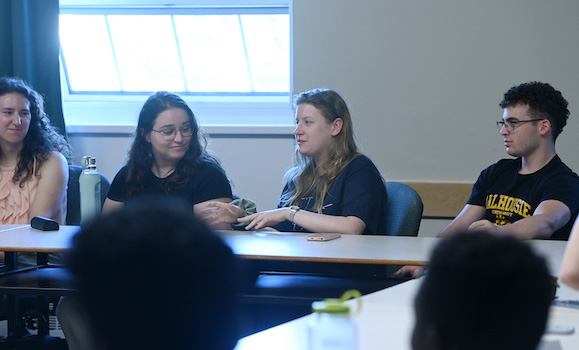
PhD students Tina Taskovic (second from left) and Anu Adamson (third from left, speaking) discuss their research.
Accelerating progress
The CBIC will feature an ultra-low humidity dry room and a high-end manufacturing line, making it a one-stop-shop for the design, production, and testing of new batteries. Battery designs currently need to be sent to third-party facilities outside of Canada to be manufactured, so the ability to do everything in-house will turn a process that normally takes months into days.
As a result, the CBIC will further establish Nova Scotia as a hub for battery research and development, with the facility accessible not only to Dal personnel, but to battery scientists from industry and academia.
It is anticipated that industry-oriented training in the CBIC, along with a new course-based Masters of Battery Technology program, will produce 25 to 50 highly qualified personnel equipped to work in battery cell manufacturing every year.
A classroom full of graduate and undergraduate student researchers chatted with Minister Wilkinson and other guests.


